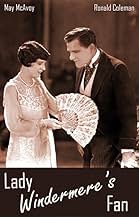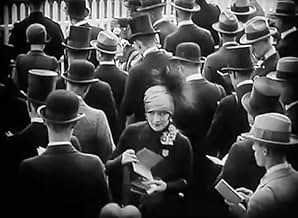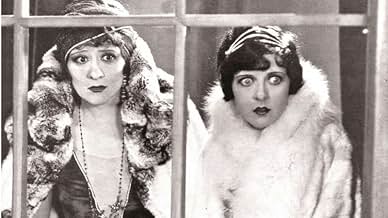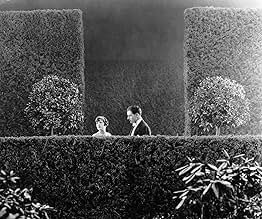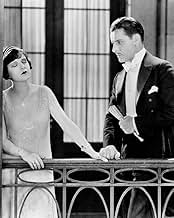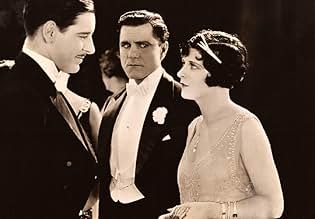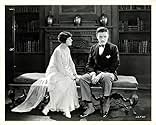IMDb-BEWERTUNG
7,2/10
1465
IHRE BEWERTUNG
Füge eine Handlung in deiner Sprache hinzuA society woman believes her husband is having an affair, a misconception which may have dire personal consequences for all involved.A society woman believes her husband is having an affair, a misconception which may have dire personal consequences for all involved.A society woman believes her husband is having an affair, a misconception which may have dire personal consequences for all involved.
- Auszeichnungen
- 1 wins total
Edward Martindel
- Lord Augustus Lorton
- (as Edw. Martindel)
Carrie Daumery
- The Duchess of Berwick
- (as Mme. Daumery)
Billie Bennett
- Lady Plymdale
- (Nicht genannt)
Michael Dark
- Party Guest
- (Nicht genannt)
Helen Dunbar
- Mrs. Cowper-Cowper
- (Nicht genannt)
Frank Finch Smiles
- Waiter with Party Guest List
- (Nicht genannt)
Larry Steers
- Party Guest
- (Nicht genannt)
Ellinor Vanderveer
- Party Guest
- (Nicht genannt)
Percy Williams
- Waiter at the Party
- (Nicht genannt)
Empfohlene Bewertungen
At first it might not seem as if the combination of Ernst Lubitsch and Oscar Wilde would work very well, but this silent-screen adaptation of Wilde's "Lady Windermere's Fan" is both enjoyable and well-crafted. Instead of clashing, Lubitsch's stylish, mischievous approach and Wilde's perceptive cynicism complement each other. The characters and the story are Wilde's, the acting and the style are Lubitsch's.
Although the material is heavily re-worked from the original play, Lubitsch's decisions all seem to work pretty well. Wilde's witty and resourceful dialogue is gone, but his insightful portrayals of human nature remain. Lubitsch also makes good use of the camera to bring off some shots that could not have worked on the stage. In particular, at times he makes the fateful fan seem almost a full-fledged part of the cast.
This movie version features solid performances by May McAvoy and Bert Lytell as the Windermeres, with a youngish-looking Ronald Colman suitably ingratiating as Lord Darlington. But Irene Rich has the most interesting character, and as Mrs. Erlynne she also gives a fine performance that particularly stands out in her scenes with the other characters. She and Lubitsch both capture the nature of her unpopular but admirable character, while carefully setting up the contrasts and conflicts between her and the other characters, who are in general more socially acceptable but far less worthy.
This also works well simply as an entertaining, often very amusing, and sometimes dramatically compelling story. For most silent film fans, it would definitely be worth tracking down and watching.
Although the material is heavily re-worked from the original play, Lubitsch's decisions all seem to work pretty well. Wilde's witty and resourceful dialogue is gone, but his insightful portrayals of human nature remain. Lubitsch also makes good use of the camera to bring off some shots that could not have worked on the stage. In particular, at times he makes the fateful fan seem almost a full-fledged part of the cast.
This movie version features solid performances by May McAvoy and Bert Lytell as the Windermeres, with a youngish-looking Ronald Colman suitably ingratiating as Lord Darlington. But Irene Rich has the most interesting character, and as Mrs. Erlynne she also gives a fine performance that particularly stands out in her scenes with the other characters. She and Lubitsch both capture the nature of her unpopular but admirable character, while carefully setting up the contrasts and conflicts between her and the other characters, who are in general more socially acceptable but far less worthy.
This also works well simply as an entertaining, often very amusing, and sometimes dramatically compelling story. For most silent film fans, it would definitely be worth tracking down and watching.
In "Lady Windermere's Fan" the great Ernst Lubitsch may have bitten off a bit more than he can chew. First and foremost, how can you reproduce Oscar Wilde's witty dialogue in a SILENT FILM?? True, the famous 'Lubitsch touch' is apparent, but minus Wilde it becomes a romantic drama.
The players are excellent and above reproach, in particular Irene Rich as Mrs. Erlynne - in fact, it is basically her picture. A youthful Ronald Colman as Lord Darlington underplays his role but is urbane and charming (in truth, I have not read or seen the play before but that is my perception). I have always liked Colman in everything I have seen him in, but, of course, you can't hear his marvelous voice and diction here.
Despite these drawbacks I enjoyed the film and felt the photography was exceptionally good. I just felt it would have been even better with a soundtrack, as it lacks the requisite bite and panache.
Sadly, a drawing room comedy of manners such as "Lady Windermere's Fan" wouldn't work today, as modern day audiences would be baffled by the subtlety and lack of action. That may be why it hasn't been remade successfully in the sound era. I give it a rating of 7.
The players are excellent and above reproach, in particular Irene Rich as Mrs. Erlynne - in fact, it is basically her picture. A youthful Ronald Colman as Lord Darlington underplays his role but is urbane and charming (in truth, I have not read or seen the play before but that is my perception). I have always liked Colman in everything I have seen him in, but, of course, you can't hear his marvelous voice and diction here.
Despite these drawbacks I enjoyed the film and felt the photography was exceptionally good. I just felt it would have been even better with a soundtrack, as it lacks the requisite bite and panache.
Sadly, a drawing room comedy of manners such as "Lady Windermere's Fan" wouldn't work today, as modern day audiences would be baffled by the subtlety and lack of action. That may be why it hasn't been remade successfully in the sound era. I give it a rating of 7.
"Lady Windermere's Fan" is a master class in silent film adaptation by Ernst Lubitsch of Oscar Wilde's play of the same name. Bringing one of Wilde's works, which are justifiably renowned for their clever word play, especially the epigrams, to the silent screen seems an act of folly, but no filmmaker at the time, and perhaps since, had a better sense of visual wit than Lubitsch--an appreciation that extended to the entire withdrawal of Wilde's epigrams from this adaptation, to be replaced largely by the sort of amusing visual gags and situations of the sophisticated romantic comedy, which was then just emerging in cinema, such as in Lubitsch's prior "The Marriage Circle" (1924), and, more specifically, that evolved into the comedy of remarriage genre.
Despite Wilde's caustic wit putting high society in its place, so to speak, the resolution of the play was a product of the Victorian morals and age in which it was written, especially in regards to the role of women as faithful wives and mothers and nothing else. Not only did Lubitsch update it to the modern Roaring Twenties in the sense that there were now automobiles instead of horse-drawn carriages, but he likewise updated its lapses into moralism with a farce that's playful to the end. Additionally, instead of preserving the play's not-so-surprising revelation that Mrs. Erlynne is Lady Windermere's mother, it announces this in Edith Erlynne's first scene; consequently, allowing for much of the humor and intrigue to be restructured around the dramatic irony of the spectator knowing what the characters do not. The updating also remakes Edith into something of a vamp or a flapper, including her wardrobe distinguishing her from the high-society clique. And, although she wishes to join their ranks, so as to marry, she also seems to relish the attention her appearance as a deviant brings her, especially from the opposite sex. I also find it amusing how she recklessly tosses her cigarettes aside rather than placing them in the ashtrays that are always nearby (two subsequent adaptations, "The Fan" (1949) and "A Good Woman" (2004), contain more obvious jokes based on Mrs. Erlynne's smoking). Although Irene Rich as Edith appears fourth in the credits, including below the star-in-the-making Ronald Colman as Lord Darlington, the play's cad, this is Rich's picture. Behind the screen, they must've known this, too, as she steals the show down to the delightfully-altered ending, although the supporting cast is quite amusing, too.
While having the unduplicated distinction of being the most prestigious director in two nations, Germany and, then, the U.S., and in both the silent and sound eras, both critically and in terms of studio clout, it doesn't seem that Lubitsch receives as much appreciation nowadays as do some other filmmakers of his era. Regardless, his "touch" is evident here, from the smart adaptation, well-crafted pacing, grand set design and the peerless comedic timing. And, this was Lubitsch's picture, as Warner Bros. gave him the rare artistic freedom for studio productions, from story selection to final cut. The original racetrack scene is a brilliant series of looks, of binocular-masked point-of-view shots and reverse angles, as Lubitsch parodies society's busybodies cackling over the sight of Edith. Throughout the picture, this system of looks is repeated in scenes where characters peer out windows. At the end of the racetrack scene, there's also a creative shot of Edith passing an "Exit" sign, as Lord Lorton follows her and a wipe closes out the scene just at the right point. Another shot relies for its comedic effect on no camera movement or editing and entirely upon how Lady Windermere re-enters the shot as she debates whether to search her husband's desk drawer.
This would be a rich film to study for its more technical aspects alone: the editing, camera placement, production design, blocking. The garden scene in the party sequence is another good example of this--how the obscuring of the spectator's view of Lady Windermere and Lord Darlington's interaction adds comedic effect while that of Edith's interaction as witnessed by Lady Windermere compounds the dramatic irony. Additionally, Lubitsch was once derisively called the "director of doors" by Mary Pickford, due to their contentious collaboration on "Rosita" (1923), and there's good, if at first seemingly puzzling, reason for the moniker. I believe his emphasis on doors is the backbone of the films' pacing, the movement of the characters and the edits. Even though he insisted on always showing characters enter and exit every door, this film has a decent average shot length of 7.4 seconds, which is also surely helped by the sparing use of intertitles. And those title cards tend to add to the farce, such as the scene focusing on the relation of a gentleman to a lady being indicated by the manner in which he rings her doorbell, which is doubly humorous when considering the director's already-established fascination with the entryways, that he now is diving into their detail with doorbells. Even when a shot seems at first to linger needlessly on the sight of a door being opened and closed, such as when Lady Windermere leaves the garden, it serves a purpose; in that case, it anticipates Edith's following her. It also helps that the doors tend to be absurdly gigantic, with doorknobs sometimes reaching near faces. The enormous sets in general, when aided by well-timed long-shot framings, add literalism to the satirical smallness of the characters amid high-handed society and personal shortcomings.
It's also notable that Lubitsch and company also adapted a 1916 version of the same story and reworked some of its alterations in "opening up" what was originally a three-sets and four-acts play. Film historian Charles Musser goes into some detail comparing the two in the essay, "The Hidden and the Unspeakable: On Theatrical Culture, Oscar Wilde and Ernst Lubitsch's Lady Windermere's Fan." The 1916 film, however, is primitively filmed from distant camera positions, bogged down by wordy title cards, with histrionic acting and more moralizing than even in Wilde's original, but without the satire. This 1925 iteration improves on all of this: an intricate use of the camera based on looks--what characters see and misbelieve they see--, nuanced performances that are allowed to display the registering of character thoughts though a more intimate camera and a pacing that is patient and yet remains energetic, lush settings and aided by the translating of the written witticisms into visual wit.
Despite Wilde's caustic wit putting high society in its place, so to speak, the resolution of the play was a product of the Victorian morals and age in which it was written, especially in regards to the role of women as faithful wives and mothers and nothing else. Not only did Lubitsch update it to the modern Roaring Twenties in the sense that there were now automobiles instead of horse-drawn carriages, but he likewise updated its lapses into moralism with a farce that's playful to the end. Additionally, instead of preserving the play's not-so-surprising revelation that Mrs. Erlynne is Lady Windermere's mother, it announces this in Edith Erlynne's first scene; consequently, allowing for much of the humor and intrigue to be restructured around the dramatic irony of the spectator knowing what the characters do not. The updating also remakes Edith into something of a vamp or a flapper, including her wardrobe distinguishing her from the high-society clique. And, although she wishes to join their ranks, so as to marry, she also seems to relish the attention her appearance as a deviant brings her, especially from the opposite sex. I also find it amusing how she recklessly tosses her cigarettes aside rather than placing them in the ashtrays that are always nearby (two subsequent adaptations, "The Fan" (1949) and "A Good Woman" (2004), contain more obvious jokes based on Mrs. Erlynne's smoking). Although Irene Rich as Edith appears fourth in the credits, including below the star-in-the-making Ronald Colman as Lord Darlington, the play's cad, this is Rich's picture. Behind the screen, they must've known this, too, as she steals the show down to the delightfully-altered ending, although the supporting cast is quite amusing, too.
While having the unduplicated distinction of being the most prestigious director in two nations, Germany and, then, the U.S., and in both the silent and sound eras, both critically and in terms of studio clout, it doesn't seem that Lubitsch receives as much appreciation nowadays as do some other filmmakers of his era. Regardless, his "touch" is evident here, from the smart adaptation, well-crafted pacing, grand set design and the peerless comedic timing. And, this was Lubitsch's picture, as Warner Bros. gave him the rare artistic freedom for studio productions, from story selection to final cut. The original racetrack scene is a brilliant series of looks, of binocular-masked point-of-view shots and reverse angles, as Lubitsch parodies society's busybodies cackling over the sight of Edith. Throughout the picture, this system of looks is repeated in scenes where characters peer out windows. At the end of the racetrack scene, there's also a creative shot of Edith passing an "Exit" sign, as Lord Lorton follows her and a wipe closes out the scene just at the right point. Another shot relies for its comedic effect on no camera movement or editing and entirely upon how Lady Windermere re-enters the shot as she debates whether to search her husband's desk drawer.
This would be a rich film to study for its more technical aspects alone: the editing, camera placement, production design, blocking. The garden scene in the party sequence is another good example of this--how the obscuring of the spectator's view of Lady Windermere and Lord Darlington's interaction adds comedic effect while that of Edith's interaction as witnessed by Lady Windermere compounds the dramatic irony. Additionally, Lubitsch was once derisively called the "director of doors" by Mary Pickford, due to their contentious collaboration on "Rosita" (1923), and there's good, if at first seemingly puzzling, reason for the moniker. I believe his emphasis on doors is the backbone of the films' pacing, the movement of the characters and the edits. Even though he insisted on always showing characters enter and exit every door, this film has a decent average shot length of 7.4 seconds, which is also surely helped by the sparing use of intertitles. And those title cards tend to add to the farce, such as the scene focusing on the relation of a gentleman to a lady being indicated by the manner in which he rings her doorbell, which is doubly humorous when considering the director's already-established fascination with the entryways, that he now is diving into their detail with doorbells. Even when a shot seems at first to linger needlessly on the sight of a door being opened and closed, such as when Lady Windermere leaves the garden, it serves a purpose; in that case, it anticipates Edith's following her. It also helps that the doors tend to be absurdly gigantic, with doorknobs sometimes reaching near faces. The enormous sets in general, when aided by well-timed long-shot framings, add literalism to the satirical smallness of the characters amid high-handed society and personal shortcomings.
It's also notable that Lubitsch and company also adapted a 1916 version of the same story and reworked some of its alterations in "opening up" what was originally a three-sets and four-acts play. Film historian Charles Musser goes into some detail comparing the two in the essay, "The Hidden and the Unspeakable: On Theatrical Culture, Oscar Wilde and Ernst Lubitsch's Lady Windermere's Fan." The 1916 film, however, is primitively filmed from distant camera positions, bogged down by wordy title cards, with histrionic acting and more moralizing than even in Wilde's original, but without the satire. This 1925 iteration improves on all of this: an intricate use of the camera based on looks--what characters see and misbelieve they see--, nuanced performances that are allowed to display the registering of character thoughts though a more intimate camera and a pacing that is patient and yet remains energetic, lush settings and aided by the translating of the written witticisms into visual wit.
Perhaps only Ernst Lubitsch could have created this masterpiece, a play by one of the world's greatest users of words turned into a silent motion picture.
I remember seeing this at the late and very lamented Silent Movie Theatre on Fairfax in Los Angeles, in the 1970s. And I remember marveling then how Lubitsch was able to create such a magnificent work.
Yes, he had the help of superlative actors -- May McAvoy's performance was truly a revelation -- and of course had the basic Wilde play as well as Julien Josephson's adaption, but it's his camera placement and where the actors performed that make this such a wonder.
I cannot recommend too strongly this "Lady Windermere's Fan," but when you go to YouTube, be careful to check out the various editions before you settle down to watch. One is terrible, but the one I saw is great. Worthy of a great movie.
I remember seeing this at the late and very lamented Silent Movie Theatre on Fairfax in Los Angeles, in the 1970s. And I remember marveling then how Lubitsch was able to create such a magnificent work.
Yes, he had the help of superlative actors -- May McAvoy's performance was truly a revelation -- and of course had the basic Wilde play as well as Julien Josephson's adaption, but it's his camera placement and where the actors performed that make this such a wonder.
I cannot recommend too strongly this "Lady Windermere's Fan," but when you go to YouTube, be careful to check out the various editions before you settle down to watch. One is terrible, but the one I saw is great. Worthy of a great movie.
Nobody was as savvy about the intricacies of the human heart as Lubitsch, and of how virtue is never an absolute.
This warmly empathetic, highly sophisticated gem is an adaptation of Oscar Wilde, with virtually none of the play's dialog utilized, but as suggestive and outrageous as Wilde himself, conceived, framed and edited as pure cinema.
From the exact same period as Cecil B. DeMille's infinitely more crass sex comedies and Charles Chaplin's equally brilliant and morally ambiguous 'The Woman of Paris', but carried by an indistinguishably European sensibility. Irene Rich as the woman who sacrifices herself in secret is impossibly glamorous and subtle, May McAvoy is truly heartbreaking as the socialite suspicious of her husband's philandering, but Ronald Colman, alas, is left with nothing much to do except smolder sexily at the fringes with those impertinently raised eyebrows.
A highlight is the Ascot game, a marvel of choreography and mime, a delicious baiting of upper class hypocrisy.
This warmly empathetic, highly sophisticated gem is an adaptation of Oscar Wilde, with virtually none of the play's dialog utilized, but as suggestive and outrageous as Wilde himself, conceived, framed and edited as pure cinema.
From the exact same period as Cecil B. DeMille's infinitely more crass sex comedies and Charles Chaplin's equally brilliant and morally ambiguous 'The Woman of Paris', but carried by an indistinguishably European sensibility. Irene Rich as the woman who sacrifices herself in secret is impossibly glamorous and subtle, May McAvoy is truly heartbreaking as the socialite suspicious of her husband's philandering, but Ronald Colman, alas, is left with nothing much to do except smolder sexily at the fringes with those impertinently raised eyebrows.
A highlight is the Ascot game, a marvel of choreography and mime, a delicious baiting of upper class hypocrisy.
Wusstest du schon
- WissenswertesOne of the 50 films in the three-disk boxed DVD set called "More Treasures from American Film Archives, 1894-1931" (2004), compiled by the National Film Preservation Foundation from five American film archives. This film is preserved by the Museum of Modern Art, has a running time of 89 minutes and an added piano music score.
- Zitate
Opening title card: Lady Windermere faced the grave problem of seating her dinner guests.
- VerbindungenFeatured in Historia del cine: Epoca muda (1983)
Top-Auswahl
Melde dich zum Bewerten an und greife auf die Watchlist für personalisierte Empfehlungen zu.
- How long is Lady Windermere's Fan?Powered by Alexa
Details
- Erscheinungsdatum
- Herkunftsland
- Sprache
- Auch bekannt als
- Lady Windermere's Fan
- Drehorte
- Toronto, Ontario, Kanada(Racetrack Scene)
- Produktionsfirma
- Weitere beteiligte Unternehmen bei IMDbPro anzeigen
Box Office
- Budget
- 320.000 $ (geschätzt)
- Laufzeit2 Stunden
- Sound-Mix
- Seitenverhältnis
- 1.33 : 1
Zu dieser Seite beitragen
Bearbeitung vorschlagen oder fehlenden Inhalt hinzufügen

Oberste Lücke
By what name was Lady Windermeres Fächer (1925) officially released in Canada in English?
Antwort
